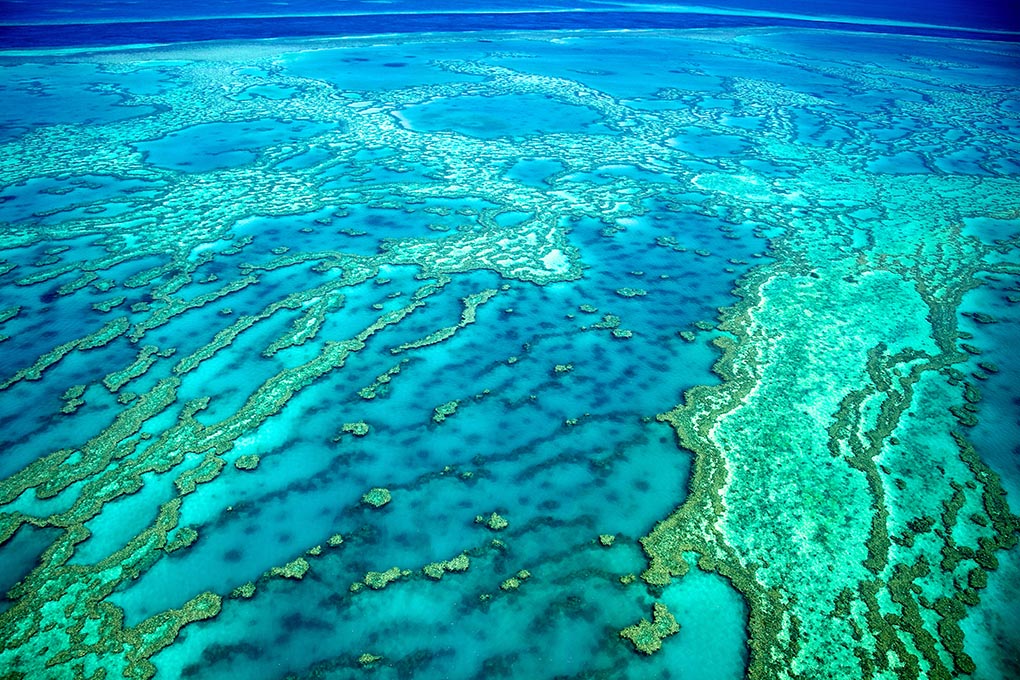
With UNESCO proposing to put an “ENDANGERED” label on the entire Great Barrier Reef, a major controversy has become heated in Australia, with the government saying it is a mistake and marine ecology experts generally in favor of the move.
Dr. Ove Hoegh-Guldberg, Professor of Marine Studies at the University of Queensland and deputy director of the ARC Centre for Excellence in Coral Reef Studies., had this to say in a recent essay in The Sydney Morning Herald:
“The overall health of the Great Barrier Reef has decreased from “poor” to “very poor” in the latest five-year Great Barrier Reef Outlook Report in 2019.
“Most significantly has been the rapid escalation of damage from climate change. In just the last five years, the Great Barrier Reef has experienced three record coral bleaching and mortality events. Taken together these impacts have killed at least 50 per cent of shallow water corals. The scale and the impact of these events has been nothing short of shocking.
“So, after 10 years of further decline in almost all dimensions plus exceptional heatwave and bleaching impacts, I think that it is time to recognise that the reef is “in danger”.
“Others feel that this is a beat-up that involves the 21 members of the Chinese-led World Heritage Committee. For the Minister Sussan Ley, this is about a government being broadsided by UNESCO processes.
“For me, however, the science is telling us that we are not doing enough to ensure the recovery of the reef from decades of declining water quality, coastal development and climate change. It is a story about rapid environmental change driving our reef to rubble.”
The World Wildlife Fund has released the following statement:
WWF says Australia must commit to a climate policy consistent with 1.5 degrees
UNESCO has sent the strongest message possible that Australia must do more on climate change and water quality to protect the Great Barrier Reef by recommending the iconic natural wonder be listed as a World Heritage Site whose status is “In Danger”. Overnight, the UN body issued a draft decision to be considered by the World Heritage Committee when it meets in July.
“After three mass bleaching events in five years, UNESCO is saying it’s critical for Australia and other nations to do everything possible to limit global temperature increase to 1.5°C,” said Richard Leck, Head of Oceans for the World Wildlife Fund for Nature-Australia.
“The recommendation from UNESCO is clear and unequivocal that the Australian Government is not doing enough to protect our greatest natural asset, especially on climate change.”
“The prospect of losing the World Heritage status of our Reef will be a huge shock for many Australians, but it is a powerful message that our Government needs to urgently lift its ambition on the threats to its existence – climate change and water quality,” he said.
Released in Paris, key points of the draft decision include that the World Heritage Committee:
- Notes with the utmost concern and regret the conclusions of the 2019 Great Barrier Reef Outlook Report (2019 GBR Outlook Report) that the long-term outlook for the ecosystem of the property has further deteriorated from poor to very poor, that the deterioration of the ecological processes underpinning the Outstanding Universal Value (OUV) of the property has been more rapid and widespread than was previously evident, and that the property has suffered significantly from mass coral bleaching events in 2016, 2017 and 2020;
- Also notes with the utmost concern that despite many positive achievements, progress has been largely insufficient in meeting key targets of the Reef 2050 Plan, in particular the water quality and land management targets, as evidenced by the conclusions of the 2017-2018 and 2019 Reef Quality Report Cards
- Noting the conclusion of the 2019 GBR Outlook Report that climate change remains the most serious threat to the property, and recognizing that action by the international community and all States Parties to the Convention is urgently required to address threats from climate change, considers that actions to build resilience of the property and address other factors remain of utmost importance;
- Decides to inscribe the Great Barrier Reef (Australia) on the List of World Heritage in Danger;
The World Heritage status of the Great Barrier Reef has been under threat since the World Heritage Committee first expressed “extreme concern” about the Reef in 2011.
The Federal and Queensland governments responded in 2015 with the Reef 2050 Plan, which included a ban on the dumping of dredge spoil and other reforms, but was largely silent on the greatest threat to the Reef – climate change.
The World Heritage Committee acknowledged these measures in 2015 but said it wanted to see improvements in the Reef’s health and would consider the matter again in 2020.
That meeting was postponed to July 2021 because of Covid.
“The landmark 2015 conservation wins focused on improving water quality and other localised actions. Since then leading scientists estimated the back-to-back bleaching events in 2016 and 2017 killed up to 50% of shallow water coral,” Mr Leck said.
“Clearly the significant coral mortality has prompted UNESCO to urge the Australian government to do more on climate.
“The federal government should seize the opportunity to transform the nation into a renewable energy superpower.
“Australia could become the world’s leading exporter of renewables by 2030. It would boost jobs, reinvigorate communities, pump up our economy, and give the Reef a fighting chance,” he said.
Read More
This time, the ‘danger’ sign must go up
Essay by Dr. Ove Hoegh-Guldberg, The Sydney Morning Herald
June 24, 2021
###




